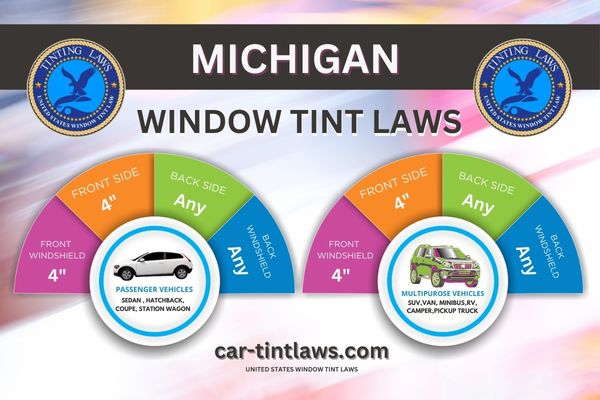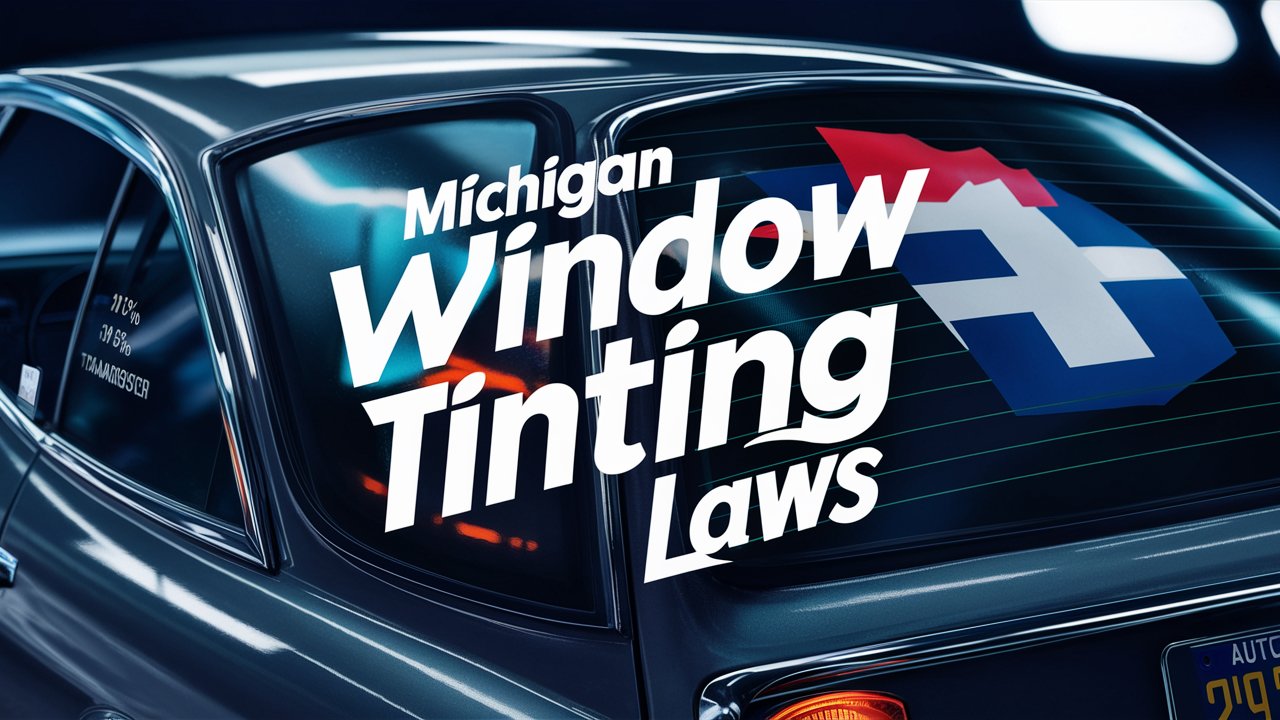Imagine driving through the picturesque roads of Michigan with your windows flawlessly tinted to shield against the sun, yet compliant with state laws.
You’re likely aware that Michigan’s window tinting laws are quite specific, varying for sedans, SUVs, and vans.
Have you ever wondered just how much tint is allowed on your front side windows or what the rules say about reflectivity and tint color?
Understanding these regulations isn’t just about avoiding fines—it’s essential for your safety and legal peace of mind.
Let’s delve into these details together to make sure you’re fully informed.
Window Tint Darkness in Michigan
When considering tint darkness for sedans, it should be highlighted that Michigan allows tinting only on the top 4 inches of the front side windows, while the back side windows have no restrictions on darkness.
For SUVs and vans, the regulations are the same for the front side windows, but you have more flexibility with the back side windows.
Be sure to check the Michigan State Police website for detailed guidelines to make sure your vehicle complies with state laws.
Tint darkness for sedans:
In Michigan, the tint regulations for sedans are as follows:
- Windshield: Non-reflective tint is allowed on the top 4 inches of the windshield.
- Front Side windows: The top 4 inches must allow more than 32% of light in.
- Back Side windows: Any shade of tint is permitted.
- Rear Window: No specified darkness limit, giving you the freedom to choose your desired level of tint for privacy and sun protection.
To ensure compliance with Michigan’s tint laws, it’s crucial to refer to the Michigan Vehicle Code for detailed regulations. Adhering to these guidelines will help you customize your sedan’s tint darkness while staying within legal limits.
Tint darkness for SUV and Vans:
- Windshield: Non-reflective tint is allowed on the top 4 inches of the windshield.
- Front Side windows: Must allow more than 35% of light in.
- Back Side windows: Any shade can be used.
- Rear window: Any shade can be used.
Window Tint Reflection in Michigan
When it comes to window tint reflection in Michigan, you need to know that the law limits the reflectivity to 35% for side windows on all vehicles, including sedans, SUVs, and vans.
This means that while there’s no specified darkness limit, you must guarantee the tint on your side windows doesn’t exceed this reflectivity threshold.
Guaranteeing compliance with these reflectivity rules is vital to avoid any legal issues.
Tint reflection for sedans:
- Front Side windows: Must not be more than 20% reflective.
- Back Side windows: Must not be more than 20% reflective.
Tint reflection for SUV and vans:
- Front Side windows: Must not be more than 35% reflective.
- Back Side windows: Must not be more than 35% reflective.
Other Michigan window tint rules and regulations
- Side Mirrors: Dual side view mirrors are mandatory if rear windows are tinted.
- Restricted Colors: Silver and gold tint colors are strictly prohibited.
- Certificates: Manufacturers of film need to certify the film they sell in the state. Make sure your window tint dealer uses certified film.
- Stickers: A sticker or label of compliance to identify legal tinting is required between the film and glass on each tinted window.
- Medical Exceptions: Michigan allows for medical exemptions for darker window tint with proper documentation. Consult Michigan state law for specific terms of the exemption.
- Penalties: Violating window tint regulations can result in a fix-it ticket for a first offense, requiring you to rectify the issue. Subsequent offenses may lead to fines or penalties as outlined in Michigan law.

Medical Exemptions for Window Tint Rules in Michigan
Individuals with certain medical conditions can apply for exemptions to Michigan’s window tinting laws by submitting a physician’s statement.
Under Michigan Law, medical exemptions allow you to use a darker tint on your vehicle’s windows if your health condition warrants it.
Conditions such as melanoma and lupus, which can be aggravated by sunlight, may qualify for these exemptions.
To apply, you need to provide detailed medical information and complete the necessary forms.
Your physician’s statement must clearly outline the necessity for a darker tint and how your condition is impacted by sunlight exposure.
Once submitted, these exemptions are reviewed for authenticity and necessity by the relevant authorities.
It’s important to verify that all medical details are accurate and thoroughly documented.
If approved, the exemption allows you to legally have a darker tint on your windows, which can be a significant relief for those with specific health needs.
Additionally, it’s essential to inform law enforcement about your medical exemption to avoid any misunderstandings during routine checks or traffic stops.
By following these steps, you can make sure that your health needs are met while staying compliant with Michigan’s window tinting laws.
Michigan Window Tint Ticket Cost
Getting a ticket for violating window tint laws in Michigan can cost you anywhere from $50 to $150.
When your vehicle’s window tint doesn’t comply with Michigan’s legal standards, you’re subject to fines and penalties.
These fines can quickly add up, especially if you don’t take corrective action. Non-compliant window tints may need removal or replacement to avoid further penalties and guarantee your vehicle meets state regulations.
If you continue to ignore the law, more serious violations could lead to a court appearance, where additional fines and penalties may be imposed.
Accumulating points on your license is another potential consequence of repeated window tint violations in Michigan.
These points can affect your driving record and insurance rates, making compliance even more critical.
To avoid these issues, regularly check your window tint levels and confirm they adhere to Michigan’s guidelines.
It’s not just about avoiding fines; it’s about maintaining a clean driving record and ensuring you don’t face unnecessary penalties.
By staying informed and compliant, you can avoid the hassle and expense associated with non-compliant window tints, keeping your vehicle legally on the road.
Michigan Vehicle Code Overview
In understanding Michigan’s vehicle code, you’ll need to know the legal tint limits for front, rear, and side windows.
The code also outlines rules regarding reflective tints, ensuring they don’t exceed specific percentages.
Additionally, there are criteria for medical exemptions, which may allow for deviations from standard regulations.
Legal Tint Limits
Michigan’s Vehicle Code specifies that non-reflective tint is allowed only on the top 4 inches of windshields.
For your front side windows, Michigan allows any darkness level on the top 4 inches, guaranteeing that your vehicle complies with the state’s legal tint standards.
The rear windows can also have any level of darkness, but they must adhere to the 35% reflectivity limit.
When considering tint for your vehicle, it’s important to know that Michigan State prohibits the use of silver or gold tint colors on any windows.
These specific tints are not allowed due to their potential to cause visibility issues and their reflective properties, which could create hazards on the road.
Adhering to these legal tint limits will help you avoid tint violations and potential fines.
Remember, while the front windshield is limited to non-reflective tint only on the top 4 inches, the side windows and rear windows offer more flexibility, yet they must still comply with state regulations.
By following these guidelines, you guarantee your vehicle meets Michigan’s legal standards, making your driving experience safer and more enjoyable.
Reflective Tint Rules
When it comes to reflective tints, Michigan law strictly limits side window reflectivity to 35%.
This regulation is part of the Michigan Vehicle Code, which aims to guarantee visibility and safety for all drivers.
Whether you drive a sedan, SUV, or van, you’ll need to comply with these reflectivity limits to keep your vehicle in line with legal requirements.
Reflective tints are designed to reduce glare and heat, but Michigan prohibits highly reflective mirror tints.
The side windows on your vehicle must adhere to the 35% reflectivity limit, which means that the tint can’t reflect more than 35% of the light that hits it.
This rule applies uniformly across different types of vehicles, ensuring that sedans, SUVs, and vans all maintain the same standard.
Compliance with these rules is essential to avoid legal issues. If your window tinting doesn’t meet Michigan’s reflectivity limits, you could face fines or be required to remove the tint.
Always check the reflectivity level of your tint before installation.
Staying informed about Michigan’s window tinting laws helps you maintain compliance and guarantees a safer driving experience for everyone on the road.
Medical Exemption Criteria
Acquiring a medical exemption for window tint requires you to provide a detailed physician’s statement and complete specific forms for review.
Your physician’s statement must clearly outline your medical condition that necessitates darker window tinting.
Once you have this statement, you’ll need to fill out the specific forms requested by Michigan’s vehicle authorities.
Authorities will evaluate your application to verify its authenticity and necessity.
They will determine if your medical condition justifies the exemption. If approved, you will be issued a necessary certificate indicating that your vehicle is allowed to have tinted windows beyond the standard legal limits.
This certificate must be kept in your vehicle at all times. Understanding the exemption duration is vital for compliance.
Typically, the exemption will have a specific validity period, after which you may need to reapply.
It’s important to inform law enforcement officers about your medical exemption during vehicle inspections to avoid any misunderstandings.
By adhering to these requirements, you ensure that you’re following Michigan’s window tinting laws while accommodating your medical needs.
Compliance with these regulations helps maintain a smooth and lawful driving experience for everyone involved.
Michigan State Police Traffic Law FAQs – Tinted windows
References
Michigan Vehicle Code section 257.709: Windshields and windows
Frequently Asked Questions
What Is the Darkest Legal Window Tint in Michigan?
You’re probably wondering about the darkest legal tint in Michigan. For car safety, UV protection, heat reduction, and privacy factors, back side windows and rear windows can have any darkness.
Remember to take into account aesthetic appeal, cost, and maintenance.
Can You Have 15% Tint in Michigan?
You can’t have 15% tint in Michigan due to visibility concerns and legal repercussions.
While it offers privacy benefits, heat reduction, UV protection, and enhances car aesthetics, verify your tint percentage complies. Consider installation, maintenance tips, and cost.
Can Cops Pull You Over for Tint in Michigan?
Yes, cops can pull you over for tint in Michigan.
Traffic stops can result from exceeding legal limits, leading to ticket fines, tint removal, and legal consequences.
Police discretion considers vehicle safety, window visibility, car modifications, and privacy concerns.
What Exempts You From Tint Law in Michigan?
Imagine a shield protecting you from the sun’s wrath. In Michigan, medical exemptions for conditions like melanoma or lupus allow darker tints, surpassing legal limitations. Always carry documentation to avoid fines and penalties, ensuring safety and comfort.
Conclusion
Following window tinting laws is essential for both safety and legal reasons. Picture your car in compliance: the front side windows of your sedan with a transparent top 4 inches, SUVs and vans meeting light transmission requirements, and all vehicles avoiding excessive reflectivity.
Remember, certain colors and certifications are regulated, and medical exemptions require documentation.
Failing to adhere can lead to fines, tint removal, and increased scrutiny, so make sure your vehicle meets all the outlined standards.
